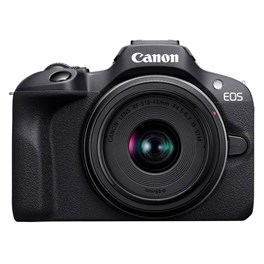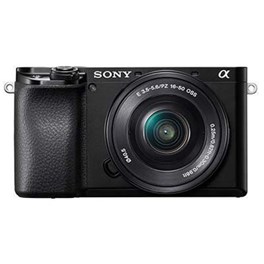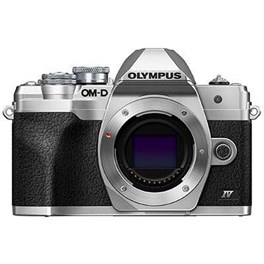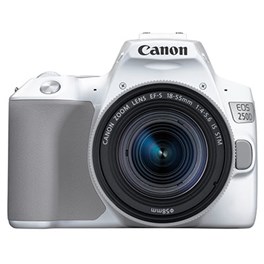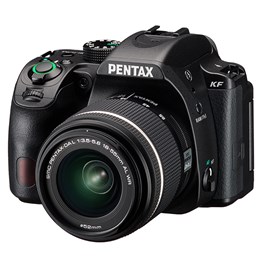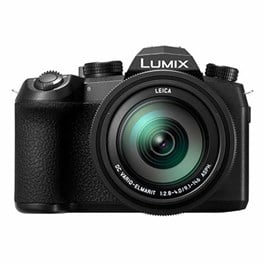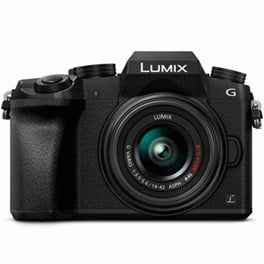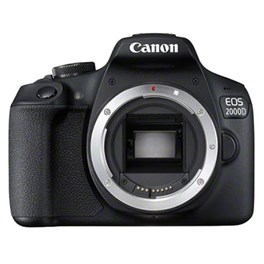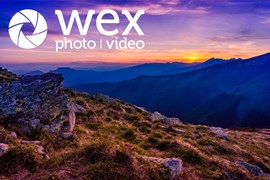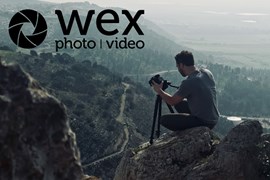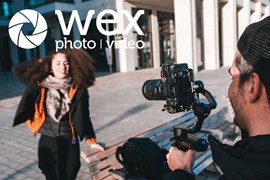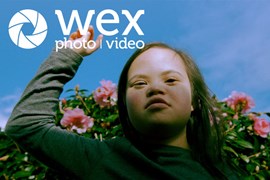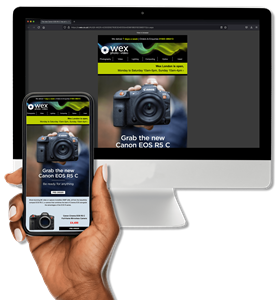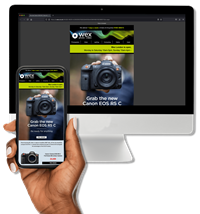
Crafting the best camera for beginners is quite the balancing act. It needs to be easy to use, but not so oversimplified that the user will quickly outgrow it. It should offer great image quality and a robust set of features that allow the user to turn their hand to multiple different subjects and shooting scenarios. Plus, it shouldn’t cost too much – even factoring in the potential cost of lenses.
The first thing to do before you start picking specific models is to figure out which type of camera you want. We’ve split this guide up by camera type to make it a little easier to navigate – here are the main categories we’re going to be dealing with.
Mirrorless cameras - Interchangeable-lens cameras that boast the latest technology, mirrorless cameras are generally smaller and lighter than DSLRs – owing to the fact that they don’t have the mirror mechanism required to field an optical viewfinder.
DSLRs - Once the kings of the camera world, there are still plenty of photographers who prefer DSLRs, and if you join any photography college course you’ll see more than a few people wielding them. They’re generally bigger than mirrorless cameras, but many appreciate them for their rugged bodies, optical viewfinders and generous battery life.
Bridge cameras - While they may look like DSLRs, bridge cameras have fixed-on lenses that can’t be changed. While this makes them less versatile, it does make for a simpler proposition for the photographer who isn’t interested in spending more money on lenses. And the fact that the lens tends to be a big old superzoom certainly helps.
Budget cameras - This isn’t its own category per se, but we’re mindful that not everyone has a lot of spare cash to spend on their hobbies nowadays. So we’ve picked out a few extra-cheap cameras that we feel still deliver excellent value for money.
There’s more to say about each category, but we’ll explain it as we go. So, let’s dive in and count off the best cameras for beginners…
Quick Navigation
Best Mirrorless Camera for Beginners
The best mirrorless cameras right now are high-end professional models, with super-fast burst rates, sky-high megapixel counts and more. However, that doesn’t mean that beginners have been forgotten about, and there are plenty of budget-friendly mirrorless options for the novice photographer or videographer who wants to get in at the ground floor.
Choosing a mirrorless system to start with will provide you with a clear upgrade path of lenses and cameras, allowing you to grow into your gear as you gain confidence as a shooter. Choosing your system may feel like a daunting task, with brand names flying past you every which way (Canon or Sony?! Fujifilm or Panasonic?!) but the truth is you have no bad options here. Every mirrorless system on the market right now has plenty to offer any photographer or videographer, all you need to do is compare their features and figure out which one suits you best. We’ve picked out four exceptional beginner cameras from four of the best mirrorless systems in the business.
Canon EOS R100 with RF-S 18-45mm Lens
Bring your special moments to life and create long-lasting memories with the Canon EOS R100. With a simple guided interface and creative assist tools for controlling parameters, this camera helps users maximise results, capturing every moment in detail-rich clarity thanks to its 24.1 MP APS-C sensor, high-performing Digic 8 processor and Dual Pixel CMOS autofocusing with Face+ tracking and eye detection.
£599.00 View
Pros:
- Excellent value for money
- Helpful beginner-friendly guide features
- Powerful hybrid autofocus
Cons:
- No touchscreen
- 4K video is cropped
New beginner cameras don’t come along as frequently as they used to, which is why we were so delighted when Canon took the wraps off the EOS R100. It’s the most affordable entry-point to the EOS R system, which also includes the firm’s flagship professional cameras, and it borrows a fair few features from its high-end cousins. One of the best is its Dual Pixel Autofocus system, which is consistently fast and effective.
As the heir apparent to Canon’s famous beginner DSLRs like the EOS 250D (more on which shortly), the EOS R100 offers loads of helpful guide modes that explain the various settings and how to use them. While it takes great pictures in Auto mode, the EOS R100 really shows its strength once you start taking control of your images – that’s the point where you start to appreciate how much more quality you’ve got here compared to a smartphone. One thing you’ll have to get used to though is the lack of a touchscreen.
Fujifilm X-T30 II Digital Camera Body - Black
The Fujifilm X-T30 II builds on the success of its predecessor, offering upgrades that will help meet the demands of the next generation of aspiring photographers and videographers. While physically identical to the original build, this model sees major upgrades to AF performance and a new high-resolution 1.62million dot LCD screen, while maintaining what we loved most about the Fujifilm X-T30.
£799.00 View
Pros:
- Beautiful out-of-camera JPEGs
- Film Simulation modes
- Retro styling with physical control dials
Cons:
- Some awkwardly placed buttons
- No in-body stabilisation
Fujifilm X cameras like the X-T30 II are beautiful pieces of kit to learn the ropes on for a number of reasons. One is their abundance of physical controls – if you take a look at the top plate of the X-T30 II, you’ll see dials for shutter speed and exposure compensation. This is a much more tactile way to get the hang of your settings than rooting through digital menus.
Fujifilm cameras are also fantastic for those who don’t want to spend a lot of time editing images in software. Fuji offers some of the best colour science in the business, with fantastic-looking JPEGs straight out of camera. The X-T30 II also offers a number of Film Simulation modes, which allow you to emulate the looks of classic film stocks like Velvia and Provia.
One commonly reported bugbear with the X-T30 II is the placement of the Q (Quick Menu) button on the handgrip – if you’re holding the camera right-handed, it’s very easy to accidentally hit it.
Sony A6100 Digital Camera with 16-50mm Power Zoom Lens - Black
The Sony A6100 Digital Camera is now available to purchase from Wex Photo Video. This mirrorless camera offers an APS-C Exmor CMPS 24.2-megapixel imaging sensor and delivers detailed high-res images with realistic colour reproduction. The user can enjoy High-Res 4K Video capture with an advanced, Fast Hybrid AF and Real-time Tracking making this camera ideal for sports events coverage as well as travel vlogging. There are plenty of time-saving apps allowing for fast image transfer straight to a mobile device. Sharing photographs to social media has become incredibly convenient thanks to this, making the Sony A6100 camera ideal for vloggers, YouTubers, influencers and travel bloggers in addition to photographers and filmmakers. To make things even better the Sony A6100 comes with the 16-50mm Power Zoom Lens that has been featured in its predecessors.
£749.00 View
Pros:
- Highly capable autofocus for sports/action
- Lots of E-mount lenses available
- 180-degree flip-around screen
Cons:
- Low-res viewfinder
- Charging port is micro USB not USB-C
Sony’s A6000 cameras have a well-deserved reputation for being great little sports and action shooters – so if you think this is the kind of photography you might want to try, the Sony A6100 is an excellent choice. Its Fast Hybrid AF system with Real-Time Tracking can lock onto moving subjects and stubbornly keep hold of them, while the 11fps burst mode ensures you won’t miss a moment. It’s also got Sony’s popular Eye AF, which does exactly what it sounds like it does – locks onto subjects’ eyes for pin-sharp portraits.
Sony’s E-mount has been around for a while, meaning you’ll have lots of lenses to choose from in addition to the 16-50mm Power Zoom the camera comes bundled with. With a flip-around screen, the A6100 is also great for family selfies and vlogging. Its 4K video consistently impresses, and it’s good to see that the excellent autofocus is also available when shooting video.
Olympus OM-D E-M10 Mark IV Digital Camera Body - Silver
The Olympus OM-D E-M10 Mark IV is a compact, lightweight and impressive camera body that is designed with travelling and mobile creatives in mind. It features a redesigned grip, faster and more precise AF, and powerful 5-axis image stabilisation which together allow you to have a steady hand and be able to capture the action in front of you in stunning detail without camera-shake. It comes with a useful flip-down LCD monitor which makes for well-composed selfies and vlogs. Equally, it has a high-definition EVF that provides you with real-time settings and a crystal clear image.
£649.00 View
Pros:
- Built-in 5-axis stabilisation
- In-camera USB charging
- Micro Four Thirds offers loads of travel-friendly lenses
Cons:
- Micro USB not USB-C
One of the most enduringly popular beginner cameras ever made, the clever little Olympus OM-D E-M10 Mark IV is an ideal way to hop on board the Micro Four Thirds system. Unlike many other beginner cameras, the E-M10 Mark IV sports built-in 5-axis image stabilisation – this helps compensate for unwanted movements when hand-holding the camera, enabling sharper shots at slower shutter speeds, in turn meaning you get better results in low light.
The Micro Four Thirds lens ecosystem is big, with loads of fantastic, lightweight lenses that make the E-M10 Mark IV one of the best beginner cameras for travel. It can shoot completely silently for those times you want to be discreet, its LCD monitor can flip down to face forward for selfies or vlogging, and it can also be powered up directly using its USB interface – just be aware it’s the older micro USB standard, not USB-C.
Best DSLR Camera for Beginners
Ah, the good old DSLR. For many photographers, you still can’t beat it, and if you elect to start your photographic journey here, you’ll be in good company. While mirrorless cameras are very much the format of the moment, with all the latest tech developments and newest lenses, there is still a robust market out there of people who prefer DSLRs.
The key difference between DSLRs and mirrorless cameras is, well, a mirror. A reflex mirror mechanism to be specific, which receives the image through the lens and bounces it up to an optical viewfinder, giving the user a real-time preview of what they’re about to shoot. Mirrorless cameras use electronic viewfinders instead, and while these are much, much better than they used to be, some photographers just prefer optical. DSLRs are often larger, too, with chunkier hand grips for a secure hold. While we aren’t likely to see many new DSLRs coming out in the future, there are still fantastic options for beginners who prefer the format.
Canon EOS 250D Digital SLR Camera with 18-55mm IS STM Lens - White
The Canon EOS 250D with 18-55mm IS STM Lens is an incredibly lightweight and compact DLSR with a 24.1-megapixel APS-C sensor, vari-angle screen, 4K video recording, and Dual Pixel CMOS AF. Easy to use and packed with the latest technology, the 250D is an entry-level digital SLR aimed at users looking to step-up from smartphone photography or upgrade from their existing compact.
£769.00 View
Pros:
- Beginner-friendly guide modes
- Small and light for a DSLR
- Reliably great image quality
Cons:
- Viewfinder AF only has 9 points (Live View autofocus with LCD is much better)
- No weatherproofing
This is probably the best beginner DSLR ever made, and very possibly the best beginner DSLR that ever will be made. Canon correctly assessed that all beginners really need is a camera that’s easy to use, that’s well priced and that delivers excellent images, and the EOS 250D is laser-calibrated to do just that. It uses a standard 24.1MP APS-C sensor, and pairs it with Canon’s DIGIC 8 processor to deliver better performance at high ISOs (meaning it does better in low light). While it produces good results in Auto, it comes into its own with its various guide modes that help new users get used to the settings.
Somewhat unusual for a DSLR, the EOS 250D is arguably better to use with its LCD screen than its viewfinder. This is because shooting in Live View mode (i.e. composing with the LCD screen) allows for the use of Canon’s Dual Pixel sensor technology powered by on-sensor phase-detection. This system is much more comprehensive and sophisticated than the dated 9-point system that kicks in when you’re shooting with the viewfinder.
Pentax KF Digital SLR Camera with 18-55mm WR Lens
As the more compact and weather-resistant sibling to the standard model, the Pentax KF Digital SLR Camera is perfect for all types of outdoor photography. Boasting a whole host of advanced, user-friendly features, this camera not only provides photographers with more creative agency but also comes equipped with the 18-55mm WR Lens for a complete setup that’s ready to deliver high-quality results.
£799.00 View
Pros:
- Rugged, cold-proof build
- In-body stabilisation
Cons:
- Lens selection not as good as Canon/Nikon
- Dated video spec
A new DSLR, in the 2020s? Yes, while other firms move away from the DSLR and plant their flags in the mirrorless camp, Pentax is sticking with what it knows and producing solid, rugged, back-to-basics DSLRs. The Pentax KF is a fairly minor refresh of the K-70, and its weatherproof build makes it an excellent choice if you plan to take your photography out into the rain, wind and snow. It also benefits from Pentax’s SR (Shake Reduction) stabilisation system.
The selection of Pentax K-mount lenses to go with the camera features many similarly weatherproofed optics. It’s not quite as comprehensive or advanced as the ranges for Canon or Nikon DSLRs, but there is still plenty of choice there. It’s also worth noting that this isn’t the best choice if you want to shoot lots of video as well as stills. It captures Full HD, but you can get more for your money elsewhere.
Best Bridge Camera for Beginners
Bridge cameras are enduringly popular among beginner photographers in a range of disciplines because they’re designed to be an all-in-one package. Though most bridge cameras look like DSLRs at first glance, the key difference is that the lens on the front is fixed and cannot be swapped out for another. The key thing though, and one of the key criteria for bridge cameras, is the fact that the lens normally offers a very big zoom range. Optical zooms of 24x or more are common, and in the case of some cameras we see incredible 125x optical zoom lenses.
Bridge cameras come with trade-offs, naturally. They have smaller sensors than interchangeable-lens cameras, which affect overall image quality and means they won’t cope as well in low light. Control is often also more restricted, and you have no way to use an aperture that’s wider than the one on the box – in all respects, when it comes to bridge cameras, what you see is what you get. However, given that bridge cameras are easy to use, affordable, and provide the kind of telephoto reach that would cost a bundle on an interchangeable-lens system, there’s still a lot to tempt the beginner photographer.
Panasonic LUMIX DMC-FZ330 Digital Camera
The Panasonic Lumix FZ330 bridge camera boasts a 24x optical zoom (35mm equivalent: 25-600mm) with fast f/2.8 aperture, splash- and dust-proof construction and 4K photo/video recording. The 12.1-megapixel high-sensitivity MOS sensor, versatile f2.8 aperture and ISO sensitivity up to ISO 6400 reduces noise in dimly lit environments and delivers crisp, blur-free shots throughout the entire zoom range. The DMC-FZ330 is capable of recording smooth, high-resolution QFHD 4K video in 3840x2160 at 30p(60Hz) / 25p(50Hz) or 24p in MP4. Taking advantage of 4K video recording performance, users can capture the fleeting photo opportunities at 30 fps in 8-megapixel equivalent resolution.
£479.00 View
Pros:
- Very affordable price tag
- 4K recording and 4K Photo modes
- Constant f2.8 aperture
Cons:
- Low 12.1MP megapixel count limits printing options
- Smaller 1/2.3-inch sensor
This budget-friendly bridge camera from Panasonic packs in a lot of features considering its price, and if you want to photograph wildlife or birds, it’s well worth a look. Let’s look at the lens first – the 25-600mm equivalent zoom lens gives you plenty of range, but what’s really welcome is the constant f/2.8 aperture, meaning you don’t have to sacrifice the tele end when the light gets low.
Like all contemporary Lumix cameras, the FZ330 shoots 4K video, and it also benefits from Panasonic’s clever 4K Photo modes that allow you to extract high-quality 8MP stills from 4K footage. This also isn’t just a camera for shooting at distance – get up close to your subjects and you can take advantage of the 1cm Macro Mode.
The drawback is the 12.1MP resolution, which is low even by bridge camera standards. For sharing images online and small prints it’ll do the job, but you won’t have much room for cropping in, or making big prints of particular favourite shots.
Panasonic LUMIX DC-FZ1000 II Digital Camera
The Lumix FZ1000 II is a powerful and versatile bridge camera, capable of high-quality photography as well as 4K video. Featuring an impressive 25-400mm LEICA F2.8-4.0 DC lens, sitting in front of a 20MP 1" sensor, powered by Lumix's Venus engine, the FZ1000 II can handle almost anything you can throw at it. A free angle 1240K dot adorns the rear of the camera, providing pristine optical feedback.
£749.00 View
Pros:
- Built-in 5-axis stabilisation
- Leica-made 25-400mm equivalent lens
- 20.1MP 1-inch sensor
Cons:
- No weatherproofing
- Shorter zoom than other bridge cameras
The Lumix FZ1000 II may have a shorter equivalent zoom lens than the FZ330, but it makes up for this in a lot of other ways. The sensor is a larger 1-inch type, and boasts a significantly bumped megapixel count up to 20.1MP. If you’re planning to make prints of your images, this will be a big help – and being able to crop in more forgivingly takes some of the sting out of losing that telephoto reach.
Equipped with 4K video and photo modes, the FZ1000 II makes a reasonable stab at being a vlogging camera as well as one for stills. Its built-in 5-axis Hybrid Optical Stabilisation is handy in both stills and video modes, especially when working at the outer end of the zoom. Bear in mind that, unlike the FZ330, the FZ1000 II has a variable aperture, so you’ll be working at a maximum of f4 when fully zoomed in.
Best Budget Camera for Beginners
The advent of the smartphone has meant there are fewer cheap cameras around these days. Given that we all have a camera in our pocket, the need for ultra-cheap point-and-shoots has diminished. However, there are still plenty of excellent beginner cameras out there that can be picked up for a bargain price, and it’s these we’re focusing on in the last section of our guide.
When shopping for cheap cameras, a good trick is to look for older models. Rather than focusing on the latest tech and features, go back a couple of generations and you can generally find significant discounts on cameras – and chances are good that, as a beginner, you don’t really need the latest tech anyway. While the cameras we’ve recommended here can be bought new, we’d also encourage any novice photographer to check out our ever-changing selection of used camera gear, as this can be an excellent way to snag yourself a deal.
Panasonic LUMIX DMC-G7 Digital Camera with 14-42mm Lens
The Panasonic LUMIX DMC-G7 combines stunning 4K (30p/24p) video, high resolution stills and a variety of practical new enhancements to help anyone capture the perfect image. Ideal for the aspiring photographer wanting to take their photography to the next level, the 16-megapixel Panasonic G7 is designed for ease-of-use without compromising on performance. The camera brings a variety of standout features including a built-in 2,360,-dot OLED viewfinder, 3.0" 1.04m-dot resolution free-angle touch screen display, improved autofocus, 8 fps burst shooting, Wi-Fi connectivity and a new 4K Photo mode that allows you to extract 8-megapixel stills from the 4K footage in-camera so that you never miss a moment.
£499.00 View
Pros:
- Camera and lens for less than £500
- Vari-angle touchscreen
- Mic socket for vlogging
Cons:
- Relatively low resolution
- No built-in stabilisation
The Lumix G7 was considered a mid-range camera on release, but these days its price and spec make it more than well-suited to beginner photographers. And vloggers for that matter – it’s got great video cred, with the ability to capture fantastic-looking 4K footage, and even finds room for a mic socket, meaning you can plug in one of the best microphones and drastically improve the quality of your audio. In a similar vein, we also like the fact that it’s got a vari-angle touchscreen, making it much easier to shoot video from all sorts of different angles.
The 16MP resolution is on the low side, especially now, but it’s still serviceable and more than enough to get started. It’s a relatively light camera, too, weighing in at just 410g, and with a huge range of lightweight Micro Four Thirds lenses at your fingertips, you should have an easy time crafting a travel-friendly setup around the Lumix G7.
Canon EOS 2000D Digital SLR Camera Body
The Canon EOS 2000D Digital SLR Camera Body is the perfect beginner camera to get you started with DSLR photography. With its easy operability, intuitive design, and in-camera guide, the EOS 2000D will bring your images to life. Create effortlessly gorgeous background blur and capture exciting moments with cinematic Full HD video. Share these in an instant thanks to the Wi-Fi and NFC connectivity. The 24.1-megapixel imaging sensor, with up to 19x more surface area than most smartphones, is sure to make your photographs stand out.
£429.00 View
Pros:
- One of the most affordable APS-C cameras out there
- In-camera guide modes
- 24MP sensor
Cons:
- Only 3fps burst
- Video tops out at Full HD
The cheapest DSLR that Canon still has on the books, the EOS 2000D is also one of the most cost-effective ways to get a new body with an APS-C sensor. While the controls and features may be fairly basic, this DSLR still produces great-looking 24.2MP images, and at this price that’s nothing to be sniffed at. You can pick it up alongside that stalwart of cheap EF lenses, the nifty-fifty EF 50mm f1.8, and still have change from £470. That’s tough to beat!
Video users will be better off with the Lumix G7 above – the EOS 2000D can’t shoot 4K, and its autofocus in Live View isn’t the best. Action shooters should also be aware that the maximum burst rate is just 3fps. Still, with Scene Intelligent Auto modes to help you optimise settings for each different situation, the EOS 2000D is an excellent place to start your photographic journey.

FAQs
What is the difference between a DSLR and a mirrorless camera?
DSLR (Digital Single-Lens Reflex) and mirrorless cameras both offer interchangeable lenses but differ in their design. DSLRs use a mirror to reflect light into an optical viewfinder, while mirrorless cameras have no mirror, relying on an electronic viewfinder or the rear LCD. Mirrorless cameras are typically more compact and have faster autofocus, while DSLRs often have better battery life and a broader lens selection.
What are megapixels, and do they matter?
Megapixels refer to the resolution of a camera sensor, indicating how many million pixels it can capture. While higher megapixel counts can provide more detail, for most beginners, anything above 12-16 megapixels is sufficient for everyday photography. Other factors like sensor size and lens quality play a significant role in overall image quality.
What is image stabilisation, and why is it important?
Image stabilisation compensates for camera shake, resulting in sharper images and smoother videos. It's crucial, especially in low-light situations or when using telephoto lenses. There are two main types: optical stabilisation within the lens and sensor-shift stabilisation built into the camera body.
What does "ISO" mean and how does it affect my photos?
ISO measures the sensitivity of the camera sensor to light. Higher ISO values (e.g., ISO 1600) allow for better performance in low-light conditions but can introduce digital noise, affecting image quality. Beginners should aim for lower ISO values (e.g., ISO 100-400) in well-lit environments to minimise noise.
Which lens should I choose for different types of photography?
The best lens for photography depends on the subject and your shooting style. For beginners, a versatile "kit lens" with a moderate zoom range is an excellent starting point. For portraits, a prime lens with a wide aperture (e.g. f1.8) creates beautiful background blur. Landscape photographers often prefer wide-angle lenses, while telephoto lenses are ideal for wildlife and sports photography.
What are the essential camera settings for beginners?
Beginners should focus on mastering the exposure triangle: aperture, shutter speed, and ISO. Aperture controls depth of field, shutter speed affects motion blur, and ISO adjusts sensitivity to light. Shoot in auto or semi-auto modes initially, gradually transitioning to manual mode as you gain confidence and skill.
What accessories are essential for photographers?
Apart from the camera and lens, essential accessories include a sturdy tripod for stability, extra memory cards and batteries, a camera bag for protection, and lens filters (e.g., UV or polariser) to enhance image quality and protect the lens.
How can I transfer photos from my camera to a computer or smartphone?
There are several ways to transfer photos: using a USB cable to connect the camera to your computer, removing the memory card and using a card reader, or using wireless transfer options such as Wi-Fi or Bluetooth, which many modern cameras offer. Some camera manufacturers also provide dedicated apps for seamless smartphone connectivity.
How do we decide?
Our in-house photography experts, store staff and partners all work collaboratively to pour over these guides. The cameras and equipment recommended in our guides are based on their personal opinion, empirical experience and of course, feedback from our customers.
We way up price, features, quality and the all-important 'je ne sais quoi' to make sure we recommend products that will delight and inspire.
If you would like more advice on any purchase our contact centre staff are here to help. Alternatively, you can reach us via email or social media.
And don't forget. If you were to purchase anything based on our recommendations you'll be covered by our full returns policy
Buying Guides

